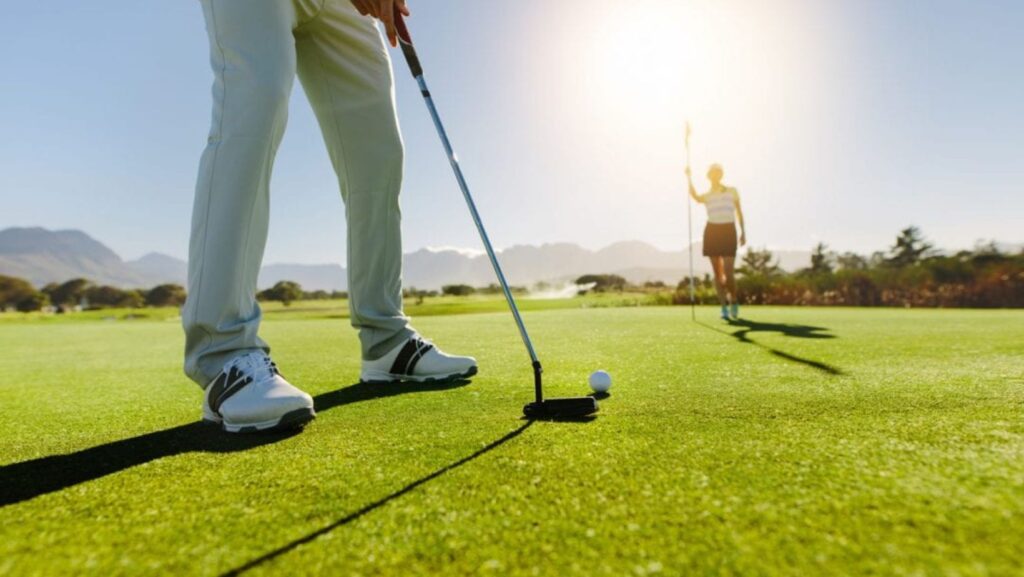
Golf, often perceived as a sport of precision and patience, holds a unique place in the world of athletics. Its beauty lies not just in the skillful swings or the meticulously manicured greens, but in the way it intertwines physical skill with mental strategy, social interaction, and a profound connection with nature.
For beginners eager to embrace this elegant sport, understanding the essence of golf and the basic gear required is the first step towards a rewarding journey.
At its core, golf is a game that challenges individuals to not only master their physical technique but also to cultivate patience, focus, and strategic thinking. Each course offers a new landscape, a fresh challenge, blending natural beauty with the intricacy of design. You can read more on this page.
The game is played at a measured pace, allowing players to savor their surroundings, be it the rolling hills, serene lakes, or panoramic vistas. This connection to the outdoors is a significant part of golf’s appeal, offering an escape from the hustle and bustle of daily life.
Golf also fosters a sense of community and camaraderie. Whether playing with friends, family, or new acquaintances, the game provides ample opportunity for social interaction and networking. Unlike many sports, golf is not bound by age or physical prowess, allowing players of different generations and skill levels to compete together. This inclusivity adds to its charm, making it a sport that can be enjoyed over a lifetime.
Golf Gear for Beginners
Embarking on the journey of learning golf requires some essential gear. The right equipment can significantly impact a beginner’s experience, making the learning process more enjoyable and effective. Here’s a rundown of the basic gear needed for those new to the sport:
Golf Clubs
The most crucial equipment for any golfer is a set of clubs. Beginners should look for a starter set that typically includes a driver, one or two fairway woods, a few irons (usually 5, 7, 9), at least one wedge, and a putter.
These clubs are designed to cover a range of distances and shots encountered on the course. While there’s a temptation to buy top-of-the-line clubs, beginners should opt for a more affordable, forgiving set that accommodates learning and improvement. Take a peek at this link https://golfgearamenity.com to explore more options when it comes to choosing the right golf club.
Balls
As a beginner, expect to lose a few balls on the course. Hence, there’s no need to invest in expensive, high-end golf balls initially.

Purchase balls that are durable and affordable. As your game improves, you can experiment with different types of balls to see what suits your play style.
Bag
A golf bag is essential for carrying your clubs and other gear around the course. Look for a lightweight, comfortable bag with enough pockets to store balls, tees, and personal items. Stand bags are a great option as they can be easily carried and set up on the course.
Shoes
Proper footwear is important for stability and grip during swings. Golf shoes with soft spikes or spikeless soles offer traction and comfort, which is crucial for beginners spending hours on the course.
Appropriate Attire
Your attire should be comfortable and conform to the dress code of the course you’re playing on. Typically, this includes collared shirts, golf trousers or shorts, and a cap or visor to protect against the sun. You can purchase Chicago Cubs shirts, hats, and jerseys to complete your sports look for your next match.
Gloves and Accessories
A golf glove, worn on the lead hand (the left hand for a right-handed player and vice versa), helps improve grip and prevents blisters.

Other useful accessories include tees, a divot repair tool, and a marker for the green.
Range Finder or GPS Device
While not essential, a range finder or a GPS device can be very helpful for beginners in gauging distances. These tools can aid in club selection and improve understanding of the course layout.
What Else to Know?
Embracing golf as a beginner involves more than just acquiring the right gear; it requires a willingness to learn and an appreciation of the game’s nuances. One of the first steps a novice golfer should take is to seek instruction from a certified golf instructor.
Professional guidance is invaluable in establishing a strong foundation in both technique and golf etiquette. An instructor can provide personalized feedback, help correct early mistakes, and offer encouragement to build confidence on the course.
Regular practice is another key element in a beginner’s golf journey. Spending time at a driving range is beneficial, as it allows for the development of muscle memory and refinement of the golf swing. Consistent practice helps ingrain the fundamentals of the game, from stance and grip to swing mechanics. It’s important for beginners to remember that progress in golf is often gradual, and improvements come with time and practice.
Understanding the rules and etiquette of golf is just as crucial as mastering the physical aspects of the game. Knowing how to conduct oneself on the course, respecting other players, and adhering to the rules not only makes the game more enjoyable but also demonstrates a respect for the sport and its traditions.
This includes understanding how to keep pace with play, maintaining the course by repairing divots and ball marks, and knowing when to let faster groups play through.
Finally, and perhaps most importantly, is the need for patience and a sense of enjoyment. Golf can be a challenging sport, especially for beginners who may struggle with the intricacies of the game. Learn more here https://www.myrtlebeachonline.com/life/grand-strand-guide/article277861468.html.
It’s essential to remain patient with your own progress and to keep in mind that every golfer, regardless of their skill level, was once a beginner. Enjoying the process of learning, the beauty of the golf courses, and the camaraderie with fellow golfers can make the experience of playing golf rewarding and fun.

Golf is as much about the journey as it is about the score at the end of the round, and embracing this perspective can make the sport a lifelong passion.












